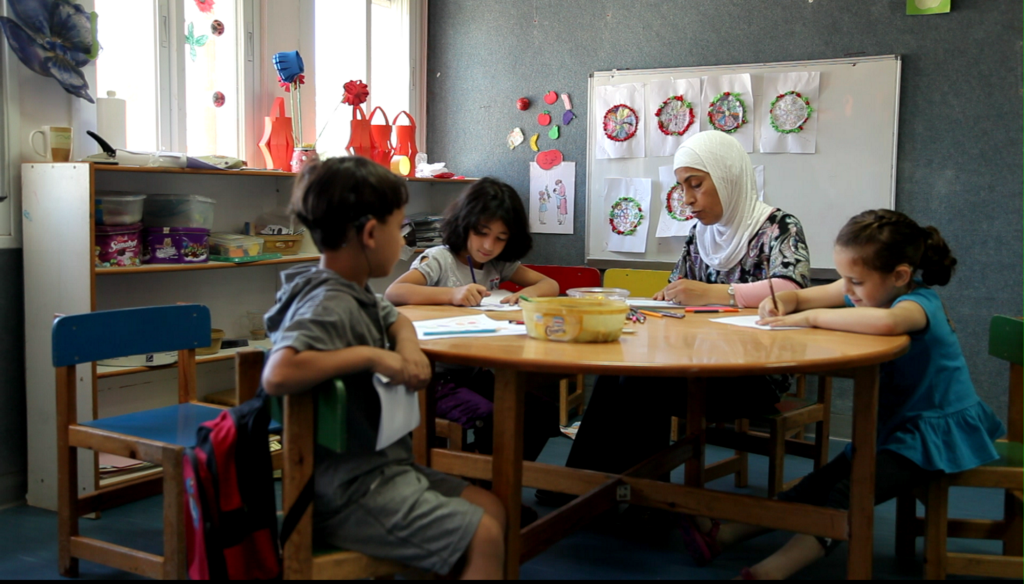Tamara Erde was born in Tel Aviv. She studied at the Bezalel Academy in Jerusalem and Le Fresnoy in France.
In her first feature film, This is My Land, Erde visits six independently run Israeli and Palestinian schools to investigate how history is taught in this contested region. (TIFF official site)
This is My Land will be screened at the Toronto International Film Festival on September 7, 9, and 13.
WaH: Please give us your description of the film.
TE: This is My Land examines how the Palestinian and Israeli (Arab and Jewish) educational systems teach the history of their nations. The film follows several Israeli and Palestinian teachers over one academic year. Through observing their exchanges and confrontations with students, debates with the ministries’ curricula and its restrictions, the viewers obtain an intimate glimpse into the profound and long-lasting effect that the Israeli-Palestinian conflict transmits onto the next generation.
WaH: What drew you to this story?
TE: Having been born and raised in Israel, I have been educated in the Israeli system ever since I was a little child. A few years after graduating high school, I began to understand how the history taught to me in school about my country was partial and selective. It was during my army service that I started to doubt and question the “facts,” history, and values I had learned in school. During my army service, which took place during the second Intifada in 2002, I began to see up close the Israeli army’s operational methods against the Palestinians. This was, for me, the first blinking of a red light, an alarm of sorts. But more time needed to pass before I discovered just how blind and ignorant I was in terms of my knowledge about “the other side” and the history of my country and area.
Several years later, I found myself wondering, “How could I have never doubted before what I was taught?” I remember moments that, back then, seemed so natural and evident. During the Memorial Day for the Israel Defense Force’s victims, we used to have a special monument, on which were engraved the names of all the school’s graduates who were later killed during the army service.
Every year, on the days leading up to this day, we would practice reading these names, and singing the hymn and the national songs for the victims, for the ceremony. And on the day itself, all dressed in white shirts, we used to share guarding the monument. Standing, each of the chosen pupils, for an hour or two, repeating the names of the list, by the candles lighting the memorial in the school’s corridor, sharing sad and serious eye-exchanges, with all who was passing by, feeling the pride and sense of belonging to this state. This, for me, was part of an ordinary childhood and school life. In this film I chose to come back and look at this education and the system behind it.
WaH: What was the biggest challenge in making the film?
TE: Managing to have a clear, balanced and, profound view of both sides — Israeli and Palestinian, without prejudging, and having both sides’ trust.
WaH: What do you want people to think about when they are leaving the theatre?
TE: The biggest achievement for me would be, if after watching the film, people have doubts, even small ones, of their prior beliefs.
This is the greatest lesson I have learned while doing this film. This is the most important lesson for the future, which I believe the Israeli and Palestinian kids can be taught.
WaH: What advice do you have for other female directors?
TE: Keep on fighting, believing in yourselves. Don’t think about being a “woman director,” but just a “director.” And remain true to yourself.
WaH: What’s the biggest misconception about you and your work?
TE: When it is seen through a prism of nationality or limited politics. I’m first a filmmaker, an image-maker, a creator of a universe, through artistic means, and then after that, a person of a certain nationality, certain political views, certain ideas I advance and believe in.
WaH: How did you get your film funded?
TE: It has been a great challenge to finance this film.
WaH: Name your favorite women directed film and why.
TE: Sarah Polley. For the topics she handles and the artistic and cinematographic universes she creates, intimate and personal, and yet universal and touching.







